

BEIJING, Sept. 1 -- Veterans Zhang Zhengguo and Hu Lidong may have never met each other but like a myriad people the world over, their lives were changed by the atrocities of war more than 70 years ago.
Zhang, now 101, still dreams of the fighting in his hometown in south China's Hunan Province, shouts of "charge forward" punctuate his slumber.
Hu, 98, can recall the names of his friends who fell during the war. "Had I died in the war, there might be nobody to remember them," he said.
THE WINDS OF WAR
In 1931, while Nazi leader Adolf Hitler was laying the ground work for his "vision" for post-depression Germany, Zhang was living with his uncle, Hu was herding cows with his three friends, and the Japanese militarists had begun to roll toward China.
On Sept. 18, 1931, Japan invaded Shenyang, capital of China's Liaoning Province. They soon occupied the entire northeast of China. Some say this was the beginning of World War II.
"Japan fanned the flames of Fascist aggression, while the Chinese took the first shot," said Wang Jianlang, head of the Institute of Modern History of the Chinese Academy of Social Sciences.
China was in full defense mode. Its people were driven by the knowledge that they were fighting for their land, their people and the honor of China.
In 1933, Zhang joined the army. Three years later, Hu Lidong and his three friends were enlisted, too.
START OF WAR FLAMES
Today, Lugou Bridge in southwest Beijing, is a calm place, but the bullet holes in the nearby fortress tell a very different story. While famously known as Marco Polo Bridge, the 800-year-old stone structure is also remembered as the location where a bloody war began on July 7, 78 years ago. This was the beginning of China's eight-year resistance against full-scale Japanese aggression.
"The bridge was so wide that many tanks could pass over it at once," recalled Hu Lidong, who was stationed nearby at the time of the Lugou Bridge July 7 incident.
International opinion is divided about what exactly ensued, but most people believe that the Japanese Army demanded to enter Wanping Town on the pretense of searching for a missing soldier. When they were not given permission to pass they attacked. Chinese troops fought back despite being outnumbered and ill-equipped.
"In the fierce battle, the Japanese had rifles, scores of tanks and fighter planes," Hu said. "Our men were mowed down."
Gen. Tong Linge was killed during the July 7 Incident, the first high-ranking officer to die in WWII.
"China was the first country to face the onslaught of the Axis Powers in 1937, two years before Britain and France, and four years before the United States," said Rana Mitter in his book "Forgotten Ally".
Zhang Zhengguo, who had been assigned to serve with the 73th Army, was despatched to Shanghai. "It was mid-Autumn, along the way people handed us mooncakes," he said. "On the packet they wrote 'we will win'."
Soldiers like Zhang were ordered to protect the Yangtze River from Japanese warships. The battle lasted for three months, before the Japanese sacked Shanghai and marched onward to Nanjing, also called Nanking, the seat of the Kuomintang government.
The freezing winter of 1937 saw the invading Japanese army kill 300,000 people within six weeks. One person was killed every 12 seconds.
British poet W. H. Auden, who was in China during WWII, drew a parallel between what was happening in Europe and China, in the poem "In Time of War."
"And maps can really point to places, where life is evil now: Nanking; Dachau." Dachau was the location of the first Nazi concentration camp in Germany to hold political prisoners.
CHANGING FORTUNES
Hu Lidong, of the 59th Army led by Ge. Zhang Zizhong, had been sent to Linyi in Shandong. He was about to witness one of the greatest battles in the war against Japanese aggression.
"It was freezing, and the snow was knee deep," he recalled. The snow and low visibility meant the Japanese could not deploy their tanks and fighter planes, so both sides were engaged in close fighting.
Many of his battalion died, the blood of fallen soldiers had turned the snow a deep, dark red.
In nearby Taierzhuang City, there was no snow, remembered Li Jingshan, 81. When the survivors returned the city after the battle, he said: "The soil was black. Then it rained, and the water ran red."
A museum in Taierzhuang has a copy of "Life" magazine from 1938, which ran a story on the battle.
"To the names of small towns famous as turning points in history -- Waterloo, Gettysburg, Verdun -- add still another. It is Taierhchwang," it said.
Some 10,000 Japanese were killed in the battle, although China suffered a heavier casualty of 20,000. Still, it was a victory that boosted morale of Chinese soldiers.
In the summer of 1938, Hu Lidong was in Xinyang in Henan Province, central China. He was part of a cover mission to attack Japanese troops at night.
"They were in the city," he said. "We had to climb over the rampart, 60 at a time."
Zhang Zhengguo, meanwhile, was in Jiujiang of Jiangxi. He and his battalion had been poisoned by gas. "I couldn't see and couldn't speak," he said. "Many of us lost conscious."
Mitter believed that China helped to delay the Japanese: depleting them of money, resources and force.
"Without the 'China Quagmire'-- a quagmire caused by the refusal of the Chinese to stop fighting -- Japan's imperial ambitions would have been much easier to fulfill," he said.
"Without Chinese resistance, China would have become a Japanese colony as early as 1938," he said. "This would have allowed [...] Tokyo to turn its attention to expansion in Southeast Asia even more swiftly, and with less distraction."
VICTORY AT LAST
In December 1941, Japan attacked Pearl Harbor. The surprise strike marked the beginning of the Pacific War.
China was no longer alone. People from more than ten countries including Britain, the Soviet Union and the United States joined China against the Japanese, most noticeably the Flying Tigers, a group of American pilots stationed in south China.
In 1943, Italy surrendered. Two years later in April, Hitler committed suicide, and Berlin, capital city of the Nazi Germany was liberated.
Zhang Zhengguo remembers how the Japanese switched from carrying ammunition by rail to road. "In the past, they used trains -- the bombs were so large," he said. "By the end of the war, the bombs were less powerful."
On Aug. 15, 1945, Hu Lidong was building fortifications when an orderly ran to him shouting: "The Japanese surrendered!" Everyone was ecstatic, firing shots into the sky and chanting "down with the Japanese!"
Liu Daomin, a veteran working at a signal station, relayed the message across the town with his radio transmitter so everyone knew.
"The people hugged, shouted and threw their hats into the sky," he said. The next day the streets were carpeted by the red paper from the fireworks.
The Japanese army had deployed 1.86 million troops in China, accounting for more than 50 percent of a total of 3.58 million Japanese troops sent overseas.
During the war of resistance against Japanese aggression, China suffered a total of 35 million military and non-military casualties, accounting for a third of the total casualties of all the countries in WWII.
Zhang Zhengguo ended his service in the army in 1950. He was later married and had two children.
After the war, Hu Lidong worked for a supply and marketing cooperative. He, too, had two children.
Hu has never forgotten his three cow-herding friends, only one of whom survived the war.
"Shang Deqiang was the eldest, and died in Hubei," he said. "Chen Yunsheng was tall and sturdy. He was killed by a bomb." Through tears, Hu explained how he had buried him, placing a wooden headstone on his tomb with the words: "Chen Yunsheng, from Changtaiguan village, Xinyang".
His eyes swollen with tears, Hu said: "I am too old to travel. But I wish I could visit him one last time and tell him what happened after he left."
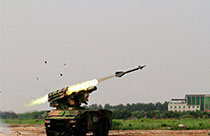 'Enemy planes' intercepted by Hongqi-7B air-defense missiles
'Enemy planes' intercepted by Hongqi-7B air-defense missiles Blind date with bikini girls in Nanjing
Blind date with bikini girls in Nanjing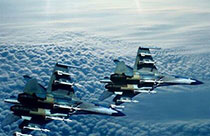 Amazing photos of Chinese fighter jets
Amazing photos of Chinese fighter jets Chinese soldiers participate in training for V-Day parade
Chinese soldiers participate in training for V-Day parade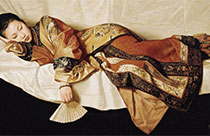 Painting: Lonely women in Forbidden City
Painting: Lonely women in Forbidden City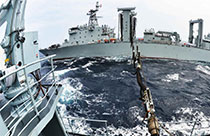 China and Russia hold joint drill in Sea of Japan
China and Russia hold joint drill in Sea of Japan 'Goddess' in Taiwan McDonald's
'Goddess' in Taiwan McDonald's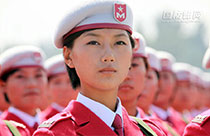 Female soldiers at military parades
Female soldiers at military parades Photos of campus belle doing splits go viral
Photos of campus belle doing splits go viral China celebrates Tibet anniversary
China celebrates Tibet anniversary Can mass protests defy Abe’s militarism?
Can mass protests defy Abe’s militarism? China’s watchdog teaches producers how to make reality shows
China’s watchdog teaches producers how to make reality shows As China’s rise alarms US think tanks, the importance of good ties must not be forgotten
As China’s rise alarms US think tanks, the importance of good ties must not be forgottenDay|Week